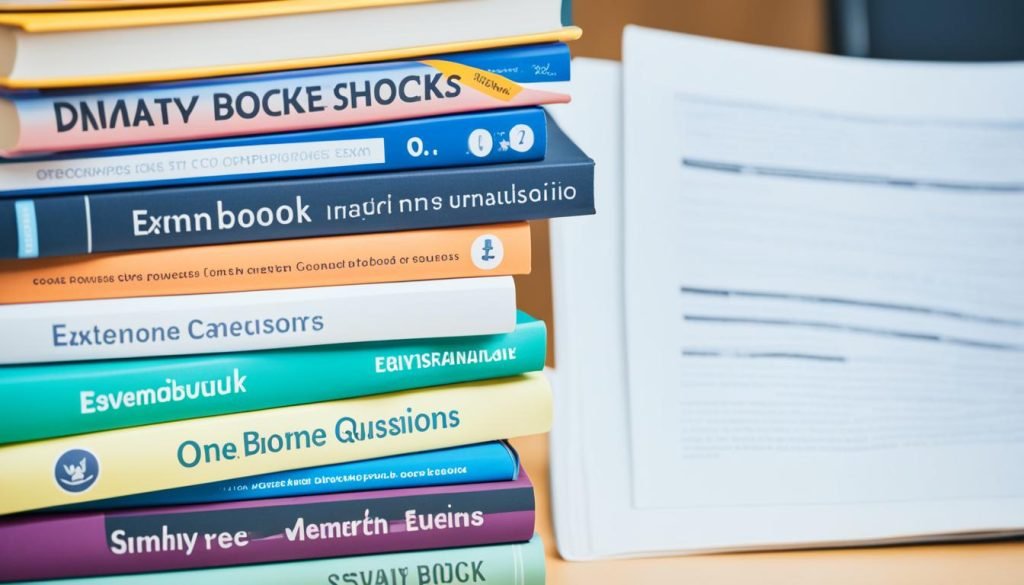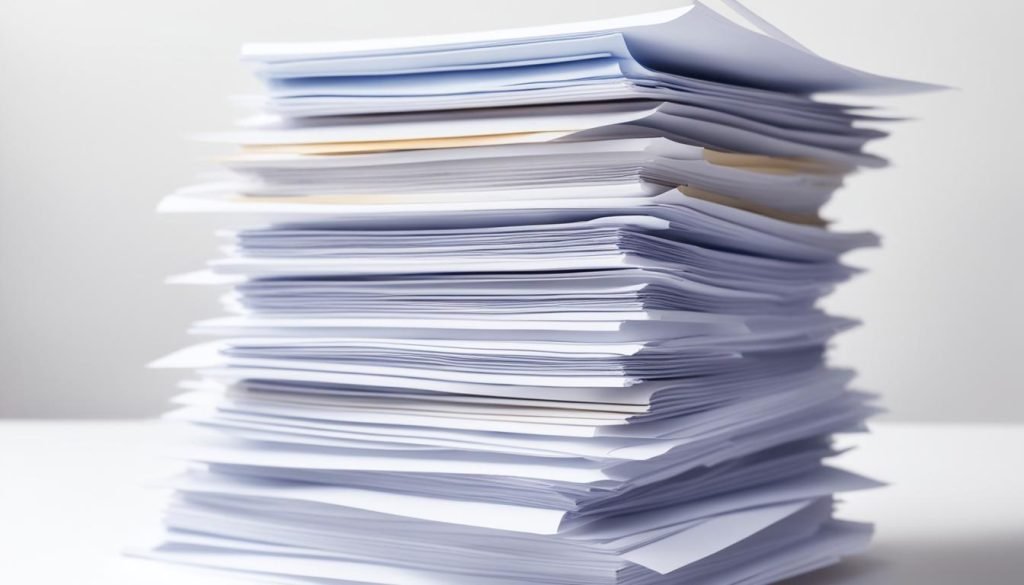Getting ready for primary school exams in Singapore can be tough. But, downloading and practicing with past exam questions can really help your child. This guide will show you how to get and use past exams to make your child more confident and raise their test scores.

Key Takeaways
- Unlock the power of past exam papers to enhance your child’s preparation
- Understand the benefits of practicing with previous year’s questions
- Discover how to access Singapore’s primary school exam resources
- Master the Primary School Leaving Examination (PSLE) format and scoring
- Tailor your revision with subject-specific practice tests
Unlock the Power of Past Exam Papers
Using previous primary exam questions is a great way to help your child get ready for tests. It makes them familiar with the exam’s format and difficulty. This helps them know what to expect and how to answer questions with confidence.
The Benefits of Practicing with Previous Year's Questions
Working with past exam papers has many benefits for students getting ready for primary school tests:
- They get used to the exam’s structure and question types.
- They learn to manage their time well during the test.
- They find areas where they need to improve their knowledge.
- They become more confident and less anxious about tests.
How Past Papers Can Boost Your Confidence
Doing mock exams and past papers can really help students. It gives them the practice they need to do well on real tests. By getting used to the exam format and content, your child will feel more confident and ready for the test.
“Consistent practice with previous year’s questions has been instrumental in boosting my child’s performance. The exposure to the exam format and content has built their confidence and helped them approach the test with a positive mindset.”
Adding past exam papers to your child’s study plan is a smart move. It helps them reach their full potential and do well in school tests.
Accessing Singapore's Primary School Exam Resources
In Singapore, parents and students can find many resources to help with primary school exams. These include past exam papers, sample test questions, and lots of exam prep materials. Knowing about these can really help your child do well in school.
Past exam papers are a great way to practice. Schools and websites have them, showing what the real exam will be like. Students can see what topics and questions they might face. This helps them know what they need to work on.
There are also sample test questions and materials to help prepare. You can find these on websites, in libraries, or at learning centers. They cover all the main topics in primary school. This lets students practice and get better at what they learn.
It’s important to look for different kinds of practice tests. You can find them at school, online, or at learning centers. Spending time on these can really help your child get ready for exams and feel more confident.
| Resource Type | Where to Find | Benefits |
|---|---|---|
| Past Exam Papers | School libraries, educational websites, learning centers | Familiarize with exam format, identify strengths and weaknesses |
| Sample Test Questions | Educational websites, learning centers | Comprehensive practice on curriculum topics and skills |
| Exam Preparation Materials | School libraries, educational websites, learning centers | Gain a deeper understanding of exam requirements and strategies |
Using all the exam resources in Singapore helps students do well. From past papers to sample questions and prep materials, these tools boost confidence. They help students see what they need to work on. This can really improve their grades.
The Primary School Leaving Examination (PSLE) is a big deal for students in Singapore. Knowing how the PSLE works and scores can help you help your child get ready. Using past PSLE questions can make them get used to the exam and learn how to handle different questions.
Understanding the PSLE Format and Scoring
The primary school leaving examination in Singapore is called the PSLE. It tests four main subjects: English, Math, Science, and the student’s mother tongue. Each subject gets its own score, and the total score is the sum of these scores.
The PSLE scores range from 0 to 300. A higher score means doing better. This score is important for picking the next school for the student.
Preparing for PSLE with Past Year Questions
Practicing with past year PSLE questions is a great way to get ready. It helps students get used to the exam’s style and question types. This makes them understand what the exam wants and boosts their chances of doing well.
- Past year PSLE questions show how hard the exam is and what it covers.
- Doing these questions helps students see what they’re good at and what they need to work on.
- It also helps them learn how to manage their time and take the exam well, which is key for a good PSLE score.
By getting the hang of the PSLE and using past year questions, students can feel confident and ready for the primary school leaving examination.
download previous primary exam question
Downloading and practicing with past primary exam questions is key for your child’s success. By using past exam papers, your child gets used to the content and format. They’ll know what to expect in their primary school assessment tests.
Practicing with sample test questions helps your child understand the exam’s structure. It also boosts their confidence for the real download previous primary exam question. This can greatly improve their performance and exam prep.
Having a wide range of past exam papers lets your child see what they’re good at and what they need to work on. This focused approach can lead to better scores and easier transitions between grade levels.
Adding previous primary exam questions to your child’s study plan is a smart move. It helps them get ready for their exams by familiarizing them with the content and format. This way, they can do their best in their future exams.
“Practicing with past exam papers is the key to unlocking your child’s full potential in primary school assessments.”
Regular practice with download previous primary exam question resources can really help your child do better in school. Give them the tools they need to succeed by providing access to these important resources.

Tailoring Your Revision with Subject-Specific Practice Tests
Getting ready for exams is more than just looking at textbooks. It’s key to focus on practice tests for specific subjects, like math. Using past exam papers helps your child see what they’re good at and where they need to get better. This way, they can make a plan to improve at different math questions.
Mathematics Practice Papers and Strategies
Math practice papers are super helpful for students. They let them:
- Get used to the look of math exam questions
- Try out different ways to solve problems and math concepts
- See where they need to get better at math
- Learn how to manage their time during math exams
By doing mathematics practice papers often, your child will get more confident. They’ll also get better at solving problems. This will help them do well in the primary school leaving examination (PSLE) and other exams.
| Revision Strategy | Benefits |
|---|---|
| Practicing with mathematics practice papers |
|
| Engaging in subject-specific practice tests |
|
Using different revision strategies, like subject-specific practice tests, helps your child prepare well for exams. This makes their study plan strong and effective.
“Consistent practice with previous year’s exam questions is the key to mastering any subject, especially mathematics.”
Science is a key subject in primary school. It’s important for your child to do well in it. Using science revision guides and sample questions can really help.
Revision guides are great for learning science. They cover the whole curriculum with clear explanations, diagrams, and practice questions. These guides help your child learn and get ready for tests.
Looking at sample questions from past exams is also helpful. It makes your child more confident and better at taking tests. These practice test resources get them used to the exam format and difficulty.
- Get your child used to the science section of the Primary School Leaving Examination (PSLE).
- Have your child practice with different sample questions on various science topics.
- Look at the feedback on the sample questions to see where they need to improve.
- Keep an eye on your child’s progress and help them as needed to get ready for the science part of the PSLE.
“Consistent practice with science revision guides and sample questions is the key to mastering the subject and achieving outstanding results in the PSLE.”
Using these resources, your child can build a strong science foundation. They’ll feel more confident and do better in school exams.
Enhancing English Language Skills with Past Papers
Learning English is key for primary school students in Singapore. Using past English exam papers helps your child get better at reading and writing. It makes them more skilled in the English language and helps them do well in exams.
Reading Comprehension and Writing Exercises
Past English exam papers give students a peek into what they’ll face in exams. They learn about the types of questions and how well they need to understand the answers. This helps them get ready for the challenges ahead.
- Reading different kinds of texts helps students get better at understanding various writing styles.
- Writing exercises like essays and letters improve their writing skills.
- Regular practice shows students what they’re good at and where they need to get better.
Doing these exercises makes students more confident in their English skills. This leads to better grades in school exams.
“Regular practice with past English exam papers is the key to unlocking your child’s full potential in the subject.”
Online resources have lots of past English exam papers for different levels and exams. Encourage your child to use these to improve their reading and writing.
Mother Tongue Language Practice Resources
Primary school students in Singapore must study a mother tongue like Chinese, Malay, or Tamil, besides English. Learning these languages is key to doing well in school. Luckily, there are many resources to help your child get better at their mother tongue.
Leveraging Past Exam Papers
Old primary exam questions are a great way to practice. They help your child get used to the exam format and question types. This practice boosts their confidence and skills in the language.
Subject-Specific Revision Guides
There are also special guides and workbooks for learning mother tongue languages. These have exercises, questions, and explanations to help your child learn important concepts.
Online Practice Platforms
Online resources have made learning easier. Websites, apps, and e-learning platforms offer fun exercises and quizzes. They help your child learn and track their progress in an engaging way.
Using these resources, your child can improve their mother tongue skills. This will help them do well in important tests and succeed in school.

| Resource Type | Benefits | Example Tools |
|---|---|---|
| Past Exam Papers |
| PSLE Practice Papers |
| Revision Guides |
| Mother Tongue Workbooks |
| Online Practice |
| Mother Tongue Language Apps |
“Mastering a mother tongue language is not only crucial for academic success, but also for preserving cultural identity and fostering a deeper connection to one’s heritage.”
By using different resources, primary school students in Singapore can improve their mother tongue skills. This helps them do well in important tests.
Good time management and strong test-taking skills are key for doing well in primary school exams. By using past exam papers, your child can learn to manage their time, find weak spots, and get better at different question types.
Being good at time management is very important for doing well in exams. Students should try timing themselves as they go through past papers. This helps them know how much time to spend on each section or question type. It also helps them not to rush or run out of time in the real exam.
Test-taking strategies can also really help your child do better. Tell them to get to know the exam layout and the types of questions they might see. Knowing this makes them feel more confident and helps them solve problems better.
Strategies for Effective Time Management
- Practice timing themselves as they work through past exam papers
- Develop a sense of pacing and learn to allocate time efficiently
- Identify and address areas where they may require more time
- Implement time-saving techniques, such as skimming passages or using scratch paper effectively
Test-Taking Strategies for Primary School Exams
- Review the exam format and structure to understand the types of questions
- Practice identifying and addressing different question types, such as multiple-choice, short-answer, or essay
- Develop effective problem-solving techniques, such as process of elimination or breaking down complex questions
- Learn strategies for managing anxiety and staying focused during the exam
By using good time management and test-taking strategies, your child can feel confident in primary school exams. Regular practice with past papers is the best way to get these skills.
| Time Management Strategies | Test-Taking Strategies |
|---|---|
|
|
“Effective time management and test-taking strategies are the keys to unlocking your child’s full potential in primary school exams.”
By getting good at these skills, your child will be ready and confident for their primary school exams. They’ll be able to reach their academic goals.
Creating a Comprehensive Revision Plan
Creating a good revision plan is key for your child’s school success. It should mix practicing past exam questions with deep understanding of the subject. This way, your child can do their best in primary school exams.
Balancing Practice and Conceptual Understanding
Practicing with past exams helps your child get used to the test format and content. But, it’s also vital they understand the subject deeply. Encourage them to look into the subject’s basics, think about why answers are correct, and use their knowledge in new situations.
By balancing practice with deep understanding, your child will be ready for all kinds of questions. They’ll feel more confident and prepared for primary school exams.

